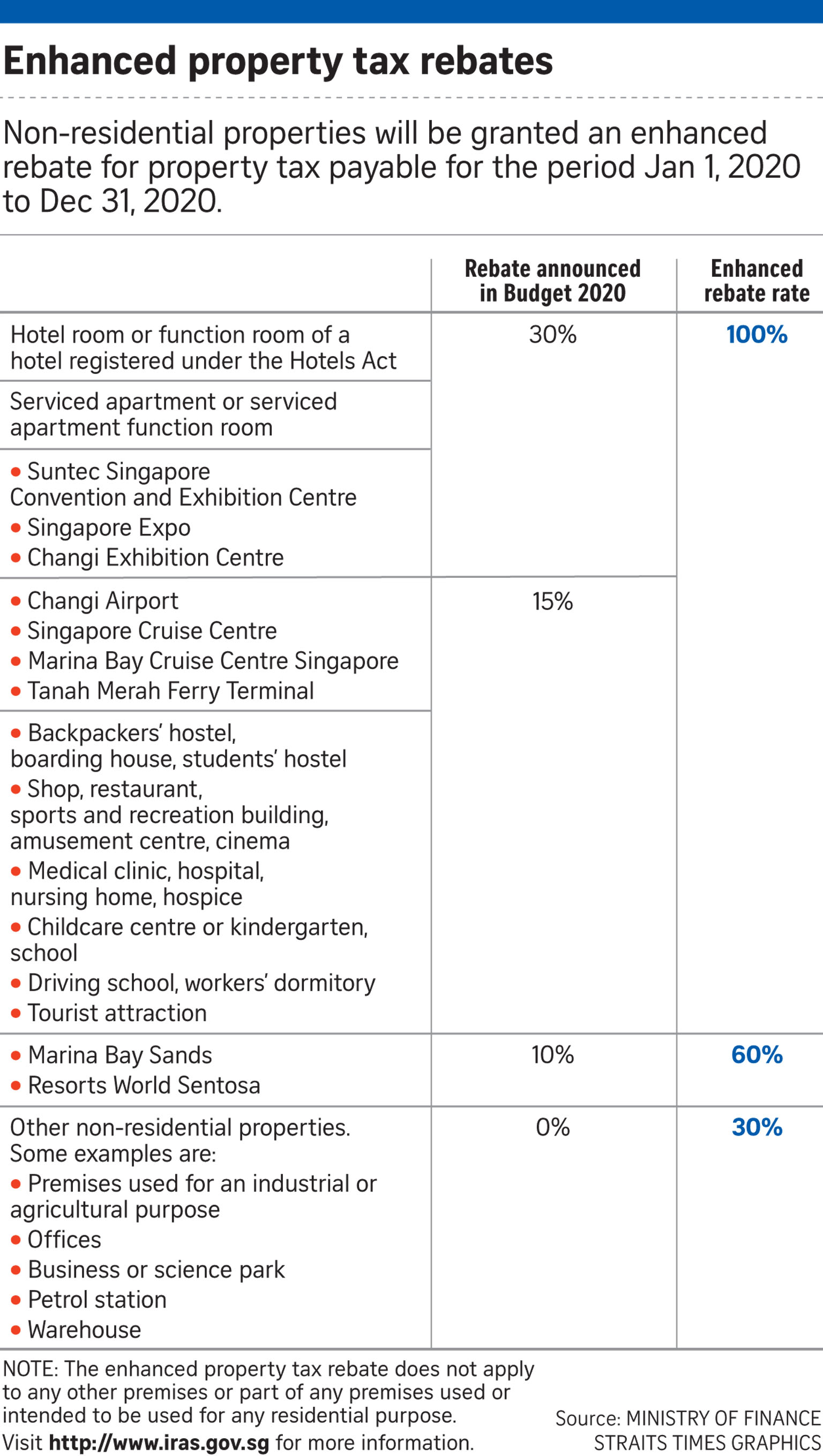Coronavirus: Weathering the storm
Higher property tax rebates for non-residential properties
About 60,000 to get tax rebate of 100%, including some 400 hotels
Sign up now: Get ST's newsletters delivered to your inbox

The 100 per cent property tax rebate for retail malls is sufficient to offset half a month's rental rebate for tenants for up to three months, said Ms Tricia Song, head of research for Singapore at Colliers International.
ST PHOTO: DESMOND WEE
Owners of qualifying commercial properties that have been badly affected by the coronavirus outbreak will not need to pay property tax for 2020.
Such properties include hotels, serviced apartments, tourist attractions, shops and restaurants, said Deputy Prime Minister Heng Swee Keat as he announced a $48 billion supplementary budget yesterday to combat the worsening pandemic.
The property tax rebate, after enhancement, would cost the Government about $1.8 billion in total, the Ministry of Finance told The Straits Times yesterday. About 60,000 properties would be eligible for the 100 per cent property tax rebate, of which about 400 are hotels.
According to the ministry, this is the first time the Government has given a 100 per cent property tax rebate for qualifying commercial properties.
The move, which is a big step up from the 15 per cent to 30 per cent property tax rebates announced in last month's Budget, aims to help landlords with cash flow issues.
A property tax rebate of 30 per cent for 2020 will also be given to other non-residential properties, such as offices and industrial properties. Mr Heng, who is also Finance Minister, urged landlords to fully pass on the rebate to tenants, such as reducing rents to ease tenants' cash flow and cost pressures.
"Many businesses have pointed out that it will be a lose-lose situation if landlords do not support their tenants. After all, if tenants fail, the properties will be empty," he said.
This comes after some tenants and associations said the earlier round of rebates had not been passed on by their landlords. The Restaurant Association of Singapore, for instance, said not all food and beverage operators have seen the rental rebates promised.
Retail and food and beverage spaces were given a 15 per cent rebate in the Budget statement last month. Hotels, serviced apartments and convention venues got a 30 per cent rebate.
The 100 per cent property tax rebate for retail malls is sufficient to offset half a month's rental rebate for tenants for up to three months, said Ms Tricia Song, head of research for Singapore at Colliers International.
But many retailers rely on landlords to pass on the rebates.
SPH Reit said it will fully pass on its property tax rebate "in a targeted manner" to tenants adversely impacted by the pandemic.
The Reit manager's board will also take a 10 per cent cut of its directors' fees "in a show of solidarity with the community". SPH Reit chief executive Susan Leng will take a 10 per cent pay cut and other senior staff, a 5 per cent cut. The cuts will take effect next month and will be reviewed at year's end.

Extending property tax rebates to office and industrial properties should offer landlords some reprieve.
Ms Tay Huey Ying, head of research and consultancy at JLL Singapore, noted: "They have been incurring costs to implement temperature screening and social distancing. They are also expected to be more flexible in lease negotiations and help tenants contain costs."
For office and industrial properties, the 30 per cent property tax rebate works out to 36 per cent of a month's rent, said Ms Christine Li from Cushman & Wakefield.
Ms Kwee Wei-Lin, president of the Singapore Hotel Association, described the supplementary budget as a "lifeline" for the industry.
The association represents 158 hotels that employ more than 40,000 workers. Ms Kwee said the property tax waiver makes a "huge difference to the bottom line", given that tourism demand is almost non-existent.
"Although there were staycations and local F&B patronage, this incremental revenue stream disappeared with the new social distancing measures," she added.
Property tax exemptions will reduce overhead costs for the meetings, incentives, conferences and exhibitions industry, said the Singapore Association of Convention and Exhibition Organisers and Suppliers (Saceos).
Deferring income tax payments for three months will relieve immediate pressure on cash flow, while changes to the enterprise financing scheme, including increased credit limits and deferred payment schedules, also help, said Saceos president Aloysius Arlando.


